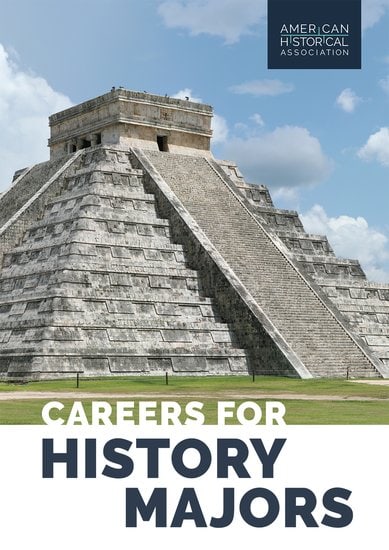 Through clear graphs and informal prose, readers will find hard data, practical advice, and answers to common questions about the study of history and the value it affords to individuals, their workplaces, and their communities. A resource for intellectual exploration and personal inspiration, it includes a statement shaped by cooperating faculty at over 100 colleges and universities describing the abilities and habits of mind that students develop in history programs at diverse institutions. The booklet’s contributors include alumni working in a wide range of fields and occupations as well as professional historians. Together, they suggest ways that today’s college students can prepare themselves to bring historical thinking to bear in solving tomorrow’s problems.
Through clear graphs and informal prose, readers will find hard data, practical advice, and answers to common questions about the study of history and the value it affords to individuals, their workplaces, and their communities. A resource for intellectual exploration and personal inspiration, it includes a statement shaped by cooperating faculty at over 100 colleges and universities describing the abilities and habits of mind that students develop in history programs at diverse institutions. The booklet’s contributors include alumni working in a wide range of fields and occupations as well as professional historians. Together, they suggest ways that today’s college students can prepare themselves to bring historical thinking to bear in solving tomorrow’s problems.
Current and prospective students, and their families, will discover an array of useful materials inside, as will career and academic advisers, faculty, program administrators, and staff. General readers can explore statistics, personal stories, and reflections on the many ways that a disciplined knowledge of the past—as well as the skills it takes to understand and communicate that past—empowers individuals to contribute and thrive in their academic, work, and civic lives.
Contents
- Introduction by Sarah Fenton
- What Can You Do with That History Degree? by Paul B. Sturtevant
- History Discipline Core by Anne Hyde
- Taking Charge of Your Education: The History Discipline Core during College by Sarah Olzawski
- Talking to Employers about Your Degree: The History Discipline Core on the Job Market by Loren Collins
- Many Paths, One Degree: Introduction by Sarah Fenton
- An Education to Last a Lifetime: Conversations with the Past, Stories for the Present by Claire Bond Potter
- The History Major: Opening Doors to Life in a Global Economy by John Fea
- Connecting Past to Present: The History Major in Our Communities by Johann Neem
- The Landscape after College: Putting Your History Skills to Work by Sarah Shurts
- What Employers Want: Thoughts from a History BA in Business by John Rowe
- The Well-Rounded History Graduate: Professional, Citizen, Human by Frank Valadez
Purchase the Booklet
You can purchase this booklet online at Oxford University Press.
- AHA individual members receive a 30% discount on AHA booklets (and all books published by Oxford University Press). To activate this discount, log in to My AHA with your AHA member account, then click the link on the next page to view our booklet selection and place your order.
- AHA institutional members receive one free copy of each booklet and can purchase more copies with a discount. Contact members@historians.org for purchase details.
- Nonmembers are also welcome and encouraged to purchase AHA publications. If you are not a member, visit the OUP’s website to view our booklet selection and place your order.
- Interested in a bulk order of 10 or more copies? Email custserv.us@oup.com directly.
Related Resources

October 29, 2025
History of Artificial Intelligence, Privacy, & Security

September 12, 2025
Unpacking the History of Higher Education

July 24, 2025